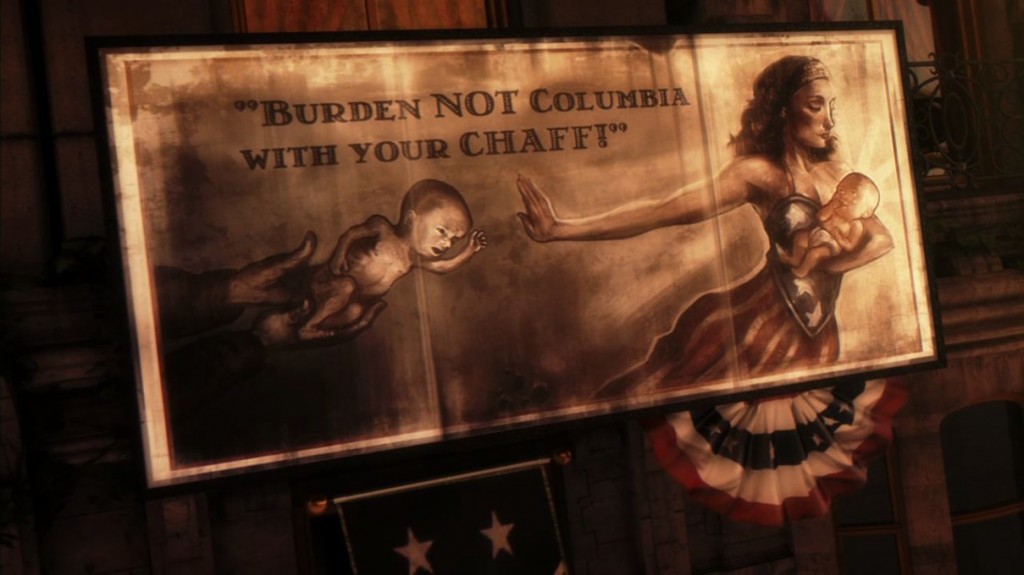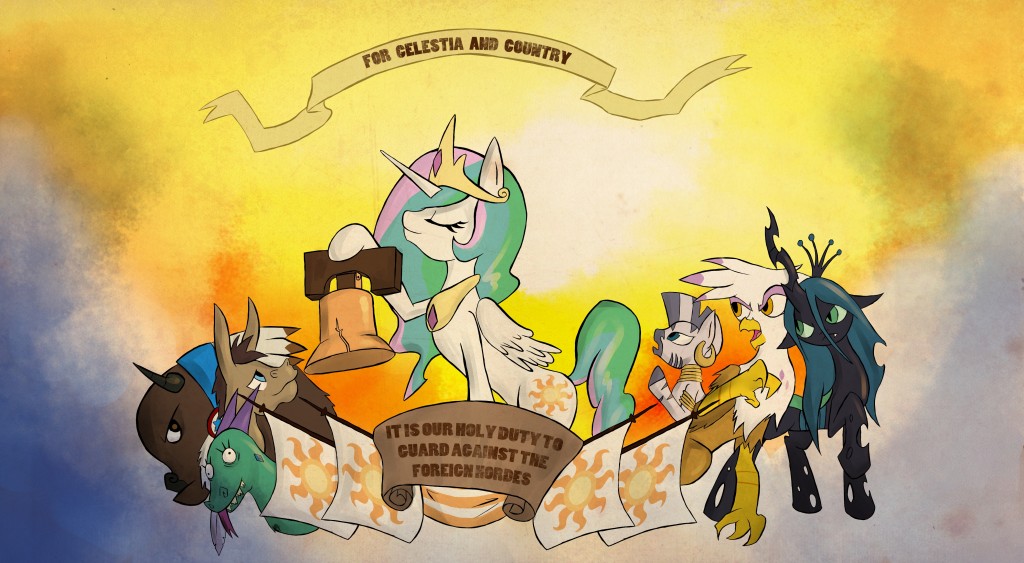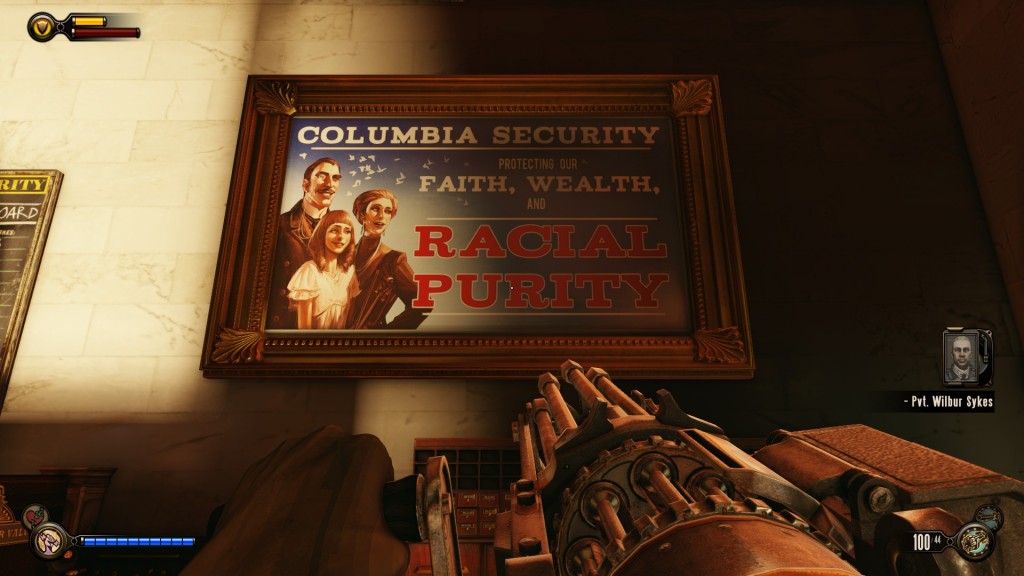Beast of America: Racism
(Welcome to the second entry in our series “Beast of America” analyzing the various social themes and messages found within Irrational Games’ latest masterpiece: BioShock Infinite.)
White people are terrible when it comes to talking about race. We approach the subject with trepidation when broached with someone besides other comfortably clueless white people, fearing humiliation for making a thoughtless and insensitive comment, however innocuous it might have sounded in our heads. So we largely keep that shit to ourselves. “No one will assume I’m racist if I give them no reason to.”
For us millennials, who have grown up in an era where racism mostly resides below the visible surface, this means having our incredibly ignorant assumptions about what racism is go largely unchallenged. Racism doesn’t affect us, it holds no force over our daily lives, its repercussions in the lives of minorities—while apparent to those of us that care to look—are no longer as obvious as they once were. Because we white people don’t have to deal with those repercussions, we remain largely ignorant of them. I think Jamelle Bouie stated it best:
“For a lot of young white people, I think, racism has become completely untethered from history. They’ve been taught “colorblindness” sans a sense of what it means to grow up in a country where white supremacy was once the ruling ideology.”
Doing research for this article for the past week has driven that point home more clearly than ever. I was originally going to write about how Bioshock’s heavy-handed approach to racism actually undermined its message, but I could not have been any more wrong. If anything, Bioshock wasn’t heavy handed enough. Reading dozens of articles and hundreds of comments about the subject, I began to realize the extent to which we young white people have compartmentalized racism, and the difficulty we have with confronting an honest portrayal of our dark history, was infinitely more terrifying than the intentionally racist bile we’ve come to expect from the internet.
Take this article for example. I’ve read it at least 20 times over and still have no idea how to grapple with it. She questions the game’s inclusion of racism as a theme, saying it made her extremely uncomfortable and that the game never explicitly addresses its racism in the end. First off, I can’t read something like:
Midway through the game, Daisy Fitzroy, the leader of the Vox Populi (the minority groups) creates a revolution to overthrow the racist elite. The game changes its tune as the enemies you shoot are white soldiers adorned in blue military uniform, effectively giving the ‘racists’ what they deserve.
and not seriously question whether she played a completely different Bioshock Infinite than I did. Beyond that, she claims, “if [the game] was to really satisfactory address [race discrimination in the 1912’s (sic)], it would do better to actually provide some answers or explanations, not present it in a thinly veiled revenge shooter against racists.” Answers or explanations to fucking what? Does she expect Elizabeth to sit Booker down at the end of the game and explain point by point why Columbian society felt it necessary to segregate and degrade a large segment of its population? Does inclusion of a frank, honest and brutal depiction of a very real part of American history need an explanation?
The most disturbing part comes with the questions she asks at the end: “Would you think twice about purchasing such a highly rated game if you knew about the heavy themes of racism?” “What about the danger of influencing younger players, who haven’t yet been subjected to an opinion on the subject of racism?” Wow. An “opinion” on racism? There are many reasons I would object to children playing Bioshock; exposing kids to a candid portrayal of white cruelty before they are “subjected to an opinion” is not one of them.
I think the fact that she is arguing to omit that aspect of 1912 American society from the game for no other reason than it makes her uncomfortable, and that she’s largely unaware that that is the point she is making is extremely telling. She’s far from alone in making that point. It illustrates exactly why Infinite’s heavy-handed approach to racism was completely necessary; Levine and his crew knew their main audience, subtlety could not pierce the thick mental walls we’ve erected around the subject.
To make their point, racism in the game needed to be ubiquitous. The atmosphere so thoroughly drenched with intolerance and prejudice its oppressive. It couldn’t be indirect or inconspicuous because far too many are completely inept at recognizing, comprehending and acknowledging those symptoms in our own society. The game doesn’t “explain” its racism, it just presents it as is, unfettered and unapologetically; that doesn’t make it window dressing, it was the only way to do it. Providing explanation would be providing rationale. Proffering a reason for pointless cruelty would be undercutting its pointlessness.
But “pointless” doesn’t mean insignificant, and Infinite does well not to isolate racism as a separate problem, detached from the rest of what ills the Columbian commonwealth. It recognizes that white supremacy and American exceptionalism are inextricably connected: superiority through birthright, regardless of evidence or reason. Religious fanaticism, industrialization, all of the themes we will be discussing throughout the week feed off of one another, spinning a massive web of corruption and abuse of power; it’s impossible to discuss one without involving the others. Severing racism from the equation would only diminish the potency of the game’s social criticism; the whole spectrum of our heinous past needs to be explored in order for any meaningful lessons to be extracted from it.
Infinite is in many ways a caricature of the worst aspects of American jingoism, but the game uses its satire as a Nabokovian springboard to a higher truth. An uncomfortable truth for many of us, but a truth it is imperative we understand. We can no longer afford to keep racism untethered from history, all of us must accept that America was a racist nation, and largely still is. The scars from Columbia’s time haven’t healed, the unjust consequences of our past still remain; simply “treating minorities no differently,” while well-intentioned on an interpersonal level, isn’t going to resolve our larger social issues. Far too many seem incapable of understanding that point. They are happy to remain behind their cloistered misconceptions about race relations in the current era, becoming ever more frustrated at “rules they don’t understand (white people can’t say the “N-word”), and double standards that seem unfair (e.g., “Why can’t we have White History Month and a White Entertainment Channel?)” simply because they refuse to apply any historical context to the situation.
But we white people won’t discuss that with anyone capable of calling us out on our bullshit, lest they think we’re racist.



